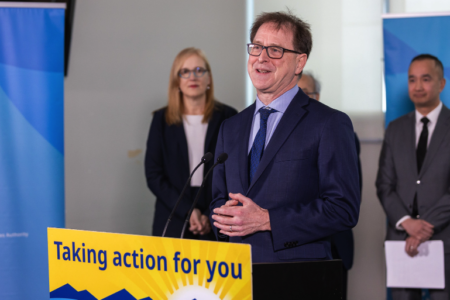Of Politics and Metaphysics
“Man is a political animal.” — Aristotle
Keep on rockin’ in the Free World.” –Neil Young
“One gets the government one deserves.” – Polish proverb
by Charles Jeanes
Federal Election 2015
This is a fine time to be a political watcher in Canada, this election year with three of the party leaders in a dead heat with each having the approval of nearly one-third of decided voters.
Do elections matter? I have to ask, get this question out of the way, because I have asked it myself in this column and offered a tepid “yes”. My yes is tepid since I know well that almost half of voters do not cast a ballot, and I am sure there is a ruling class who actually determine the most important directions our country is going, regardless of the party in government.
Within the confines of these serious limitations — of our institutions, of our poor system for fair representation, of the power of an elite to shape the public mind, and the extent of voter disengagement, I will again offer a mild “yes” to the question.
Elections matter, for policy differences among parties and leaders are concrete in effects on our lives, when they are enacted in law. Stephen Harper has surely proven that to us. He has altered Canada a lot in his short time in power.
Harperite conservatism in practice has meant these concrete effects:
1. Our foreign policy is radically changed from former years, not long ago. We are now uncritical supporters of Israel and of military missions with NATO in faraway places like Afghanistan and Libya and Iraq, and of militarism against Putin and Iran and IS.
2. We support the UN far less than formerly we did; our peacekeeping contribution has fallen to #73 among world nations. We show contempt for the UN, and we have accordingly lost our seat at the Security Council.
3. We practice a disguised racism against the Natives of Canada, as seen in refusal to sign a UN declaration on native rights, and in refusal to investigate abuse of aboriginal women, who have disappeared or been murdered in alarmingly high numbers, with a Commission. And Harper avoids agreement with the Truth and Reconciliation Commission by very carefully never using the phrase “cultural genocide.”
4. We show scorn for science by underfunding research into our ecologies, by muzzling scientists who might support new climate-change policy with their findings, by ending the long-form census, by destroying science libraries and ending funds for researchers.
5. We have accepted Harper’s definition of our economy as a “commodity superpower” and let the petro-industry be the spine of our development. We have let industrial strategy languish when we might have led in new technologies for alternative energies. We suffer now for this obsession with raw resource exports by the sudden fall in oil prices.
6. We have let Harper’s ideological crusade against taxes lead us into lack of revenues for infrastructure renewal and payments to provinces. The big corporations are under-paying their way in this country. We like that his tax strategy lowers our individual taxes; this is a poor reason to under-tax big business. His “balanced” budget is a falsification of the true fiscal picture of Canada.
7. We have let our health and education systems decay from underfunding because the federal government has ceased to fund the provinces’ plans. The provinces are not respected by Harper, and he avoids the conferences of premiers that former prime ministers always attended. He lets them struggle to meet their health and education budgets knowing full well that their tax revenue potentials are less than Ottawa’s.
8. Our drug-law policy is retrograde, going against the liberalizing trend everywhere else.
This is a quick list I came up with in no time. It is not complete. But it makes my point. A government with Harperite ideology makes an important difference to the nation we live in.
Conservatives
Harper is not a Canadian Conservative. The party of this name, founded by John A. Macdonald in 1867 from his earlier Ontario/Quebec party called the Liberal Conservatives (in the 1850’s), was called Conservative until the 1940’s; then it added “Progressive” to its name because it had absorbed the remnants of a Prairie populist party called the Progressives, who had held significant power in Parliament in the 1920’s.
Harper has inherited the party of Preston Manning, called first Reform and then the Canadian Alliance. In 2003 he and Peter McKay agreed that the latter would merge his party, the Progressive Conservatives, with Harper’s party and call the new entity the Conservatives, and that Harper would be the leader, not McKay. The Reform name disappeared, but not its ideas.
This was the end of Canada’s traditional Conservatives with their blue and red Tory wings. It signalled the new economic and political power of the West, just as the earlier Progressives had a base in the West, but Reform/Alliance lacked appeal in Ontario, unlike the old Progressives and United Farmers parties with their strong Ontario support.
Reform had a slogan under Manning: “The West wants in!” He argued that the West was not properly represented nor respected by the centre of the country, despite how the West had risen in wealth, population, and importance in Canada. Harper had settled in Calgary and been a key player in the Reform party long before he emerged as its leader after 2000.
Stephen Harper is not merely conservative in a traditional sense of being rather religious, identifying with rural “values” while being thoroughly urban himself, and having a distaste for governments that interfere in social issues which are best left to community standards. He is personally against abortion and homosexuality but will not roll back the status quo in Canada. He is eagerly willing to fight the War on Drugs and War on Crime as conservatives wish. His views on right-to-die issues are reactionary. His rhetoric is anti-big-government but his actions are not always in line with that, though he does strive to deliver on his promise to cut taxes for everyone. Harper is an oddball in public forums when he offers his blessing, “God bless Canada.”
Harper has a base, everyone who watches politics knows. It is among people who agree with all the positions I outlined in the previous paragraph. But he is furthermore an ideologue, not a quality often seen in our prime ministers in most of our history.
Alberta is the province where his heart resides despite his Ontario upbringing; it is the province where one giant industry, oil, has shaped the economy and politics. His economic ideas are basically a rehash of neoliberal free market capitalist dogma, not in any way original, and he has a lot in common with American Republican ideology about free markets and freedom in the Western world.
Harper can win the coming election, with a minority but more seats than other parties, and he might govern as he did before 2011, keeping Liberals and NDP sufficiently off-balance to carry a mildly-conservative agenda. Give him a majority and his ideological bent will have full force. The battle is in Ontario, where he has to win sufficiently to add to the solid base the West will deliver to his party. Quebec is lost to him, and the Atlantic provinces lack voting power.
Liberalism and Trudeau charisma
Canada was ruled by the Liberals for many more years in the twentieth century than by the Conservatives. Liberals began to be called “the Natural Governing Party” in those years. That is ancient history and those days will not come again. Canada has changed too much.
The party has great traditions of inclusivity. Every kind of opinion not of the extreme ends of the political spectrum can be found in it. Social democrats, soft socialists, red Tories, and mildly-libertarian populists, have been content in the big Liberal tent. This century Canadians seem less likely to be contented this way, for tribal, special-interest, boutique politics have become more normal.
Political ideologies of left and right have weakened as a new “culture of rights” has matured, with feminist women, sexual minorities, ethnic groupings, environmentalists, and religious tribes, all permitting one particular Cause to be the most-important or sole determinant of their politics.
An end to our first-past-the-post electoral system would reflect this new reality better with a multiplication of parties. Proportional representation would give us a system where the various interests would have to form coalitions to govern in Parliament. It sounds like truly vigorous democracy to me, but in the absence of a reformed system, the Liberal strategy is to hug a centrist position that may not make sense any longer.
Justin Trudeau is the Liberals’ one trump card. Why? I confess I cannot understand his appeal. He is not seasoned and he has not proven his abilities. His father was a giant in statesmanship; Justin cannot aspire to be so respected. Read the excellent biography of Pierre Trudeau by the husband-and-wife team of Max and Monique Nemni to understand just how Pierre planned to be a statesman in his youth and succeeded in his middle age. His son lacks most of the qualities and experiences that made Pierre so formidable. Justin has charisma but not intellect, charm but not political maturity. We like him but we rightly doubt his abilities.
I will make a prediction about Justin Trudeau, based on what I have seen of him so far. He will trip himself up by a stupid public utterance he had not thought through. He does not speak well without being prepared, he cannot effectively think on his feet, he is not skilled during impromptu Q and A sessions. That is where he will commit his blunder. His gaffe will be caught on media and go viral. Justin and his party will struggle to explain “what he really meant” – but the damage will be irreparable because the other parties will skewer him unmercifully for his lack of leadership skill.
We’ll feel sorry, we forgive gaffes, but our sympathy will not move us to vote for him.
Thomas Mulcair and the Quebec mystery
How did the NDP make a breakthrough in Quebec, a province lacking a provincial NDP and no tradition of voter support for this party in federal elections? Ask how the Bloc Quebecois left a vacuum that neither the Liberals nor Conservatives were prepared to fill for Quebec voters who needed somewhere to mark their ballot.
And add the Jack Factor, for the charm of Jack Layton during an election campaign when he, but not the public, knew his life might be cut quite short. Layton was not well known in Quebec, but he ran a campaign distinguished by humility and compassion, and he appealed to the communitarian ethos of the Quebecois electorate.
Thomas Mulcair was chosen to take Layton’s sainted place, and had to overcome his past in order to do that. He was an ex-Liberal in provincial politics, a cabinet minister under Jean Charest, who was once a Conservative in federal politics and became a Liberal in Quebec. Ah, the curiosities of politics. Recall that Bob Rae went from being an Ontario NDP premier to a Liberal who almost became party leader, and you see how Canadian politics do not expect hard lines drawn between political inclinations…
Is the NDP socialist? No. It is a Labour party, not much different than its sister parties in the UK or Australia. Jack Layton purged socialism from the NDP when he stifled the New Politics Initiative at the time he became leader. Canadian socialism in pure form existed for 30 years from 1931 to 1961 when the Cooperative Commonwealth Federation of J. S. Woodworth and Tommy Douglas flourished. It merged with the union movement in 1961.
Mulcair is very competent, has a respectable record as Quebec’s environment minister to appeal to green voters, and has performed extremely well as Leader of the Opposition. He has earned his place in the three-way tie among the leaders of the federal parties seeking to become prime minister. He has 103 seats in Parliament; 57 are in Quebec.
I doubt Quebec will give the NDP 57 seats again, and I expect the Liberals to improve their total there, but Mulcair will hold onto the majority of its seats, and he will make gains in Ontario. He is bound to do well in BC and Alberta too because the right-wing parties there who have ruled so long in the two provincial capitals are in low repute with voters. The Liberals will not make any inroad in Alberta, and in BC Justin Trudeau’s incapacities for leadership will mean his party comes third in seat totals. The West will sink Liberal hopes for minority government.
A hung Parliament
Harper will win a plurality, is my expectation. That is, he will have more seats than either of the other parties, but the total of the other parties’ seats will outnumber his own. He will try to form government. All then depends on the NDP and Liberals swiftly deciding to defeat Harper in an immediate non-confidence motion, and in being able to agree quickly to govern as a coalition with one prime minister – Thomas Mulcair. Pierre Trudeau was P.M. in a coalition with the NDP from 1972 to 1974; his son will have to settle for being the number-two man in a coalition with Mulcair. This is my prediction for the political landscape in November.
The wild card in this scenario is Harper and the Governor-General he has appointed. When Harper is defeated by a non-confidence motion, precedent says the G-G must ask the other parties if they can form a government. But precedent is not binding. The G-G can decide to call another election if Harper advises him to dissolve Parliament.
Remember Harper’s near-defeat by a coalition of the Liberals under Dion and the NDP under Layton, with the Bloc as silent third member of the proposed government? Harper and his GG Michaelle Jean defeated that opportunity for us to be rid of his government in 2009 by proroguing Parliament. Harper maintained his power with a minority government until the election of 2011 when he won his majority. The coalition alliance dissolved into chaos.
We cannot count on the G-G giving Mulcair and Trudeau an opportunity to form government if they defeat Harper in a parliamentary vote. It is possible Harper and the G-G will push a new election upon us right away in 2016. I sincerely hope that doesn’t happen.
Aboriginal Policy: a difference that makes a difference?
A friend has disagreed with my generalization about Canadians’ views on how Natives have been abused by our governments. I said, “Canadians agreed with their governments” when the national residential school system was attempting to eradicate Indians by the horrid cleansing programs and deadly abuses in the many years that system operated.
I did not say all Canadians agreed with that policy — but I hold that when a system lasts as long as this evil one lasted, and the electorate made no issue about what was happening, that is an expression by silence that the voters agreed with the policy. We consented by not asking for a change. On other occasions and in other issues voters have protested a government action so loudly and in such numbers that government had to listen. This is how Mulroney was forced to retract a pension policy for senior citizens, because those citizens rose up in protest.
Canadians did not care to know particulars of Indian policy, we just accepted the status quo and never made the policy an issue of substance at elections. The Indian policies of Canada have been racist. They aimed to make Indians disappear by making them become like everyone else — all in the name of their good and for their progress.
This changes nothing
The differences among the three parties in the upcoming federal election are substantive. Yet I hold that there is a basic sameness to the parties that must be manifest. We live within a certain kind of economic and social order and all parties adhere to that as normal. Capitalist markets and “growth” in our economy are the only ways our politicians understand how to govern. No one wants a revolution that goes to the root of our problems, to attack poverty by redistributing the obscene wealth of the one per cent. There is no party intending primarily to revolutionize our way of eating and earning and making so that we might save our planet from degradation. Naomi Klein says capitalism is against the climate and now that we know that, everything is changed. But is it? Are we acting differently? Look at how low gas prices have meant Canadians are driving more and buying bigger vehicles. New-car sales are booming.
Now we know more about the evil of our Indian policies and the injustices and horrors perpetrated upon First Nations. The German people after Hitler’s defeat had to face the question of their responsibility for Nazi crimes. Will Canadians go through the same soul-searching to answer why we practiced cultural genocide against Natives?
I see no sign we have the stomach for such a process, nor any intention to recompense Natives for our theft of their land ever since Europeans came to Canada. Germany has been extremely sensitive about its genocidal record, by giving much material support to Israel, and about its aggressions, by not being a major military power since the war. How will Canadians manifest our responsibility for the crimes of our past governments against Natives?
Conclusion
I conceive of the relationship between our government and our minds and consciousness as essentially a metaphysical relationship. I do not understand the mechanisms and physics that explain why an entire nation such as ours empowers its governments to do what they do.
Did we will the annihilation of First Nations from this land we invaders from Europe have called Canada? Not in so many words. But racism was our mindset from early colonial days, sanctioned by our cultural elites, our scientific intellectuals, our religious and political leaders, our ideologies.
In profoundly determinative ways, therefore, I do not think the party holding government power is ultimately of the first order of importance. Our consciousness determines the kind of politicians we choose, and the kind of political normalcy we live within. What the mass of us want, in the “public mind” of Canadians, will be manifested by our political and legal order.
The leaders matter, but not that much. Policies matter, but not that much.
Harper has enacted policies the other leaders say they opposed and we might expect a complete reversal of all Harper has done, once the other parties hold power. That will not happen. As evidence, just look at how vociferously Mulroney’s Free Trade deal was opposed by the other parties. Yet when the Liberals won power a few years later, they did not tear up the treaty nor begin to withdraw from it, but rather pushed the neoliberal global free trade agenda that the corporate masters of the world economy have decreed. More and more such free trade deals have been agreed by all major Western and OECD nations. This is what the corporations want.
Now it would seem that we are forming a consensus that environmental damages must stop, beginning with climate change caused by our CO2 industrial emissions. But the proof of that consensus is not apparent to me. Governments like Harper’s have said NO to putting any brake on economic growth and job creation for the sake of the environment.
Ultimately, the electorate is not the ruling class of Canada nor any other capitalist nation. We are at the mercy of a money economy far beyond our control. No matter whom you vote for, the government will get in. Government will serve the ruling class and that class will change its ways only if it must, not because it has a collective epiphany and wants to give away its power.
This is the metaphysics of government. It cannot rule without the consent of the governed. And consent is going along with what is. For a reasonably good analysis of how our minds decide the future, go see the new Disney film, Tomorrowland, and listen very carefully to the final speech by the Hugh Laurie character, who is the villain of the piece. He will explain how the collapse of the world can justly be blamed on all of us, not just some few bad leaders like him.

























